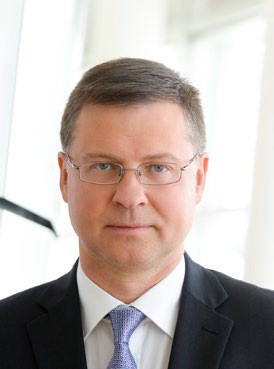
I look forward to working with ministers in my new capacity.
Our dialogue highlighted once again the important role that trade plays in the Union’s wider ambition for a sustainable economic recovery.
It must be a key component in making sure we have an economy that works for people.
Let me highlight some points from the two crucial topics on our agenda today:
- The new leadership of the World Trade Organisation
- The role of trade in the future recovery, against the backdrop of the EU’s on-going trade policy review;
Let me start with the WTO, which is currently selecting its new Director General.
The discussions today have shown strong agreement amongst ministers that the EU needs a Director General, who is capable of managing a profound reform of the organisation.
This reform should focus on three main things:
- Fixing the dispute settlement system,
- Reinitiating global trade negotiations,
- Addressing the current challenges of international trade, in particular sustainability and the need for a level-playing field.
To be credible, the new leader of the WTO:
- must enjoy the trust of WTO members and
- be able to present balanced views that reflect the diverse nature of the WTO Membership.
The EU will view the remaining five candidates in this light.
And as Minister Altmaier already outlined, ministers also stressed the importance of the Union continuing to remain united through the next steps of the WTO selection procedure.
Let me turn now to trade’s role in the recovery; and, in particular, our own Trade Policy Review.
This review was launched before the summer and runs until mid-November.
It will help the Commission to map out the EU’s new strategic direction for a global trade policy.
We are using the Review to stimulate a debate across the Member States and have organised events in 18 Member States so far.
We want to hear directly from those impacted by trade policy: citizens, businesses – big and small, non-governmental organisations, and of course, Member States governments themselves.
The Commission will draw these strands together in a new policy Communication early in 2021.
Even if the details still have to be worked out, there was general agreement today that trade can and should play a crucial role in our economic recovery.
There was consensus that trade policy creates opportunities to grow through open trade with third countries
This is all the more important as businesses of all sizes, as well as our societies at large, seek to diversify supply chains and make them more resilient to future shocks.
There was also agreement that trade policy also helps protect European companies against abuse and unfair trade.
We agreed that the biggest risk for European industries in the long term is unfair competition. So level-playing field issues will also be very important in our trade policy.
We need to ensure we are able to act in situations where others break the rules, creating an uneven playing field that undermines or harms European industries.
Levelling the playing field should never mean lowering our own standards.
It is about bringing everyone else to a higher level.
That is the only way we can keep the rule of law, the trust and the consistency that business and economies need in order to grow in a sustainable manner.
Our discussion on the specific challenges of the Steel Sector, where we were joined by Commissioner Bretton and by the President of Eurofer, illustrated the importance of joined up policy across the Commission, and between the European, national and local levels.
More specifically, the EU’s industrial policy and trade policy are working hand in hand to find the most effective ways to support the EU’s economic recovery, climate neutrality and digital leadership.
They are also able to offer an exciting and competitive future for the most innovative parts of our economies.
I take away three main things from today’s conversation:
- First, we must seek greater coherence between trade, competition, regulatory and industrial policies.
- Second, there is broad agreement that we need to find the right balance between openness, regulation and supporting EU industries without distorting competition, and
- Third, the EU remains a trading superpower. It has benefitted greatly from open and rules-based trade, primarily driven by market dynamics. And its continued success will be built on these fundamentals.

















